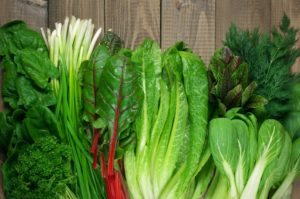
Some of the most common causes include heavy drinking and consuming an unhealthy diet, high in fats, causing excess weight to accumulate. It follows, then, that consuming a healthy diet could prevent the condition from developing. Recent research has confirmed this hypothesis, in a study that finds consuming more leafy greens, can lower your risk of fat build up in the liver.
The researchers first tested their hypothesis in mice and then confirmed the results by using cells cultured from human livers. The mice were fed a diet high in sugar and fat, which the researchers compared to that of the average adult living in Western society. They then supplemented the mice’s diet with dietary nitrate and found that the level of fat found in the livers of the mice was significantly lower.
“No one has yet focused on nitrate, which we think is the key. We now want to conduct clinical studies to investigate the therapeutic value of nitrate supplementation to reduce the risk of liver steatosis. The results could lead to the development of new pharmacological and nutritional approaches,” said Dr. Mattias Carlström, one of the researchers behind the study. Dietary nitrate is mainly found in leafy greens and other vegetables.
Dietary Nitrate Improves Insulin/Glucose in Diabetics
The results of the study showed a clear decrease in the risk of liver steatosis in the mice whose diets were supplemented with dietary nitrate. The researchers also noted added benefits of the change included lowered blood pressure and improved insulin/glucose homeostasis in the mice subjects that had type 2 diabetes.
The focus of the researchers is on preventing cardiovascular disease and type 2 diabetes through dietary interventions, as well as other methods. Previous research finds that consuming nitrate derived from vegetables can increase the efficiency of the mitochondria in the human cell, which is the powerhouse of the cell and helps to control physical endurance. It is also well-known that consuming a healthy diet, rich in fruits and vegetables, can lower one’s risk of developing many cardiac conditions including cardiovascular disease and can improve symptoms caused by certain types of diabetes.
“We think that these diseases are connected by similar mechanisms, where oxidative stress causes compromised nitric oxide signaling, which has a detrimental impact on cardiometabolic functions,” said Dr. Carlström.
“We now demonstrate an alternative way to produce nitric oxide, where more nitrate in our diet can be converted to nitric oxide and other bioactive nitrogen species in our body. And it doesn’t take huge amounts to obtain the protective effects we have observed—only about 200 grams per day. Unfortunately, however, many people choose not to eat enough vegetables these days.”
Also read:
- Simple diet plan to overcome fatty liver disease: Foods to eat and avoid
- Eat Green Leafy Vegetables to Slow Down Cognitive Decline